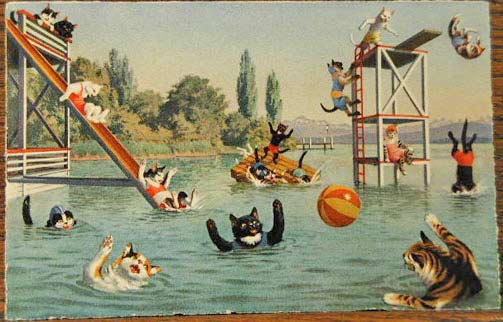Sort of.
While most dogs do enjoy swimming and most cats don't, it isn't a hard and fast rule that divides the species.
"Not all cats hate the water and not all dogs love it, but generally speaking, the domestic cat doesn't seem to like to swim," said Kelley Bollen, the director of behavior programs for the College of Veterinary Medicine at Cornell University.
There could be a number of reasons for that, Bollen told Life's Little Mysteries.
"One contributing factor could be that their hair coat doesn't dry quickly and it's simply uncomfortable to be soaking wet. I also think because cats are 'control freaks' and like four feet on a solid surface, they do not appreciate the sensation of floating in the water," said Bollen, who also runs the Animal Alliances behavior practice in Massachusetts.
Some dogs, on the other hand, are specifically bred to 'work' in the water, such as the aptly-named Portuguese Water Dog, the Duck Trolling Retriever and the Irish Water Spaniel, Bollen said. These breeds are great swimmers, unlike heavy-set breeds such as bulldogs and dogs with short legs, such as daschunds.
Besides some genetic factors, dogs are also much more likely to be introduced to water in a pleasant way from an early age than cats are, said Suzanne Hetts, a wildlife biologist with Animal Behavior Associates in Colorado.
There are plenty of exceptions, however, Hetts said.
"All you have to do is go on YouTube and watch all kinds of home videos of cats playing with water coming out of the faucet," she said.
On a related note, cats sometimes need to eat canned food because they often don't drink enough water daily. Research has shown that lack of water intake is directly associated with urinary blockages. Be sure to observe the drinking habits of your cat and supplement with canned food if necessary.









 RSS Feed
RSS Feed




